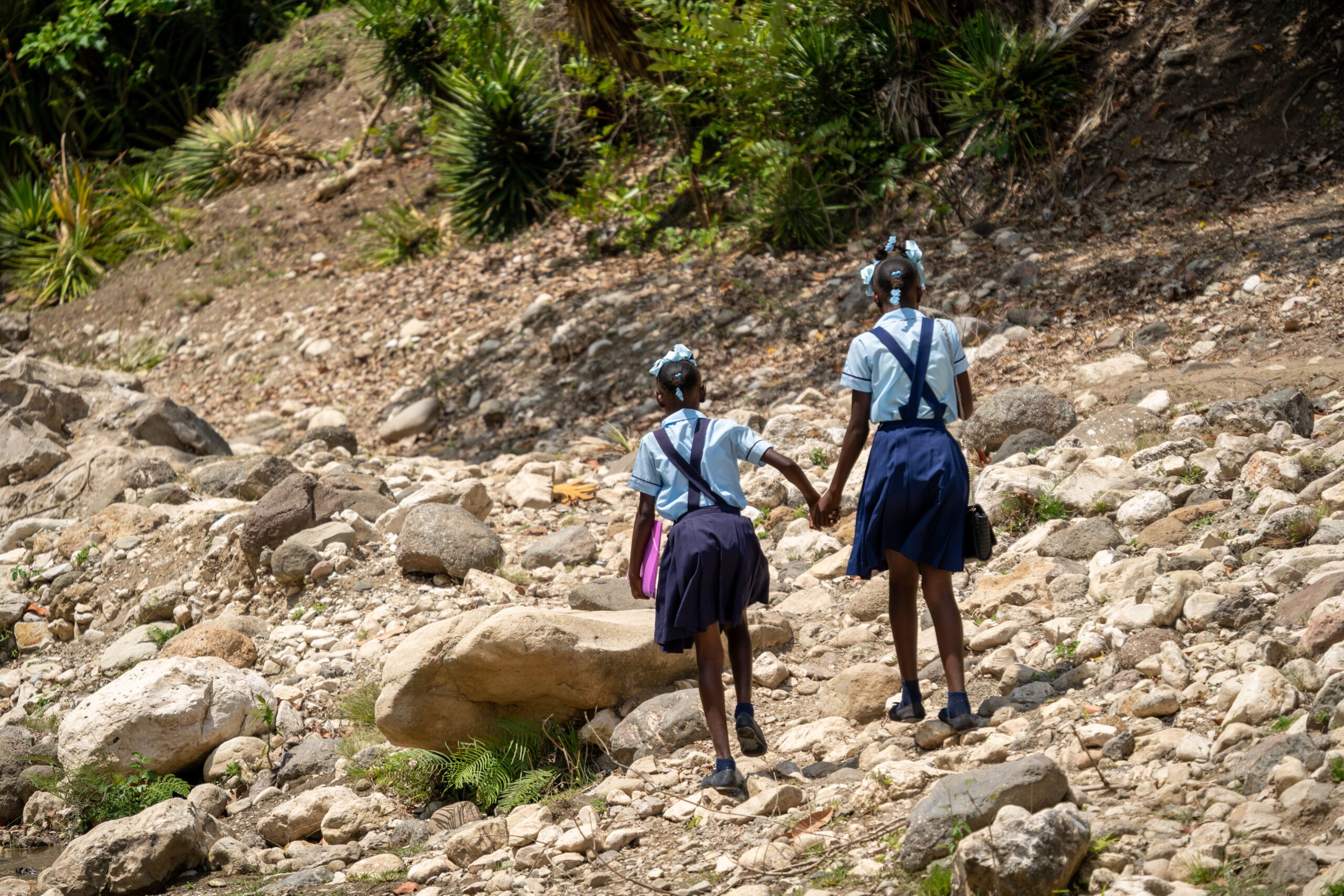Worsening hunger and increased violence mean fewer opportunities for Haitian girls
12 June 2023A worsening hunger crisis, combined with political and social upheaval has increased the risk of sexual and gender-based violence for young women in Haiti.

Girls crossing a river to get to school in Haiti.
There are increased reports of girls and young women being exploited and forced to engage in transactional sexual activities as a survival strategy, according to Plan International’s rapid gender analysis that has just been carried out in Haiti’s North-East Department.
The new study has found that more than 68% of women and 85% of adolescent girls face acute risks to their own safety, including reports of attacks while traveling to school, accessing water or simply moving around their communities.
Girls’ education suffering
Risks to personal safety and financial hardship are among the reasons some families are removing girls from school – despite the analysis showing that school is a relatively safe space for girls. When taken out of school early, girls are more exposed to unintended adolescent pregnancy and increased exposure to gender-based violence.
However, according the analysis, when adolescent mothers return to school they are often exposed to stigma from their peers, which can become an additional barrier to them continuing their studies.
“Learning is extremely difficult when I am hungry and tired, which is often the case, especially during the crisis,” said Salinda*, a 12-year-old girl interviewed in the northeast department. “If this situation continues, I will have to leave my studies behind and do small business activities to help my family meet basic needs,” she said.
Girls struggle to maintain sexual health
Girls and adolescents with disabilities face additional challenges accessing resources to manage their menstruation, as they are unable to access support from other people when there are no proper sanitary facilities in their schools.
“I didn’t eat before I came to school and I don’t know if I’ll eat anything when I get home.”
Dina*, 12.
“I don’t even have money to buy sanitary towels. I just use pieces of white cloth instead. Some bad people take advantage of this miserable situation to offer young girls’ money in exchange for sex. Some of my friends accepted, but I have always refused,” said Jessica*, an 18-year-old girl.
Access to contraception and other sexual and reproductive health services has become more challenging in Haiti. According to the study, about 70% of households surveyed said they had access to family planning services before the crisis, compared to 20% after the deterioration of the crisis.
“Haiti is facing a devastating hunger crisis and women and girls are paying the price. Girls are more vulnerable to unwanted sexual advances, which can lead to non-consensual sex and heightened risk of unintended pregnancies and sexually transmitted infections. Unless action is taken now, more lives will be lost,” said Daphne de Bordes, Acting Director of Plan International Haiti.
Loss of income for families
The current long period of drought in northeast Haiti has lead to widespread crop losses and starved households of income. This has meant families are forced to reduce the frequency, portion size and quality of meals, which has the worst impacts on children under 5, adolescent girls, pregnant women and those who are breastfeeding.
“I didn’t eat before I came to school and I don’t know if I’ll eat anything when I get home,” said Dina*, a 12-year-old girl.
The cost of living and hunger have been worsened by chronic instability and gang violence that disrupt nation-wide supply chains, access to basic services like markets, schools, and hospitals and the livelihoods of Haitians.
Girls also have less capacity to earn a reasonable income, despite often working just as hard as men. The study shows how men riding motorbikes can earn up to 750 gourdes (US$5.32) daily but women also earn 360 gourdes (US$2.55) daily working more than 12 hours (or even late at night). In 90% of households surveyed, husbands determine how household expenses are distributed.
The situation has led to increased reports of children under the age of 5 being malnourished, with at least 5 cases of malnutrition being reported per week at a health centre in the northeast department.
Plan International’s response
Plan International is urging international donors to substantially increase their support for the humanitarian response in Haiti, prioritising severely and acutely malnourished children and the creation of more financial opportunities for families and communities.
We have been scaling up operations in Haiti since the escalation of the hunger crisis a year ago and provided support to 30,995 people, including cash transfers and education on nutrition. More than 1,000 households have also received hygiene kits following a cholera outbreak, including menstrual hygiene kits for adolescent girls and women.
*Names changed to protect identities.
Categories: Emergencies


